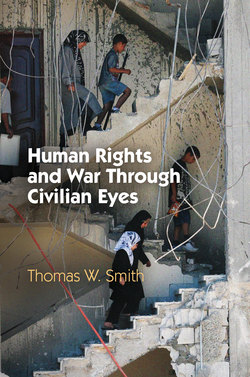Читать книгу Human Rights and War Through Civilian Eyes - Thomas W. Smith - Страница 8
На сайте Литреса книга снята с продажи.
ОглавлениеPREFACE
The prohibition against directly targeting civilians in war may be the strongest norm in all international relations. Nevertheless, civilian devastation remains a hallmark of today’s armed conflicts. Terrorists and zealots and “unlawful enemy combatants” routinely kill and maim innocent people. But so do state militaries that profess to follow the laws of war, also known as international humanitarian law, or IHL. The image of modern humanitarian law is the judge advocate in the war room surveying the battlespace and advising the generals on the legality of particular tactics and targets. It’s not the war room of Dr. Strangelove with its jingoistic antics and blinking “big board.” Far from it. Humanitarian law genuinely strives to limit the destructiveness of war, particularly as regards the treatment of noncombatants. The legal notion that civilians should be spared the hard hand of war is not absolute, however. It is designed to mitigate civilian harm while upholding, within limits, the prerogative of states to pursue military necessity and strategic advantage. It weighs the lawfulness of war from the standpoint of the state’s actions and intentions, not from the standpoint of war’s collateral victims.
I propose that in thinking about war we expand our moral field of vision and focus much more on the effects of war on civilians. This book adopts the conceptual framework and moral resolve of human rights to try to do justice to the civilian experience. The argument is philosophical in the sense that it recognizes the intrinsic value of human life and human dignity. But it is also vividly empirical. One of the book’s central themes is that the depth and detail of rights helps to constitute civilians and civilian protections around extramilitary human rights norms. The specificity of rights conveys the terror and anguish of people whose lives are shattered by war. We see the overt violence of artillery fire or bomb strikes, of breaking down doors in the middle of the night, of arbitrary roundups and detention, of torture and abuse, and of the destruction of civilian property; as well as the insidious and long-term effects of shattered economies, rent social fabrics, collapsed public health, and constricted lives. Rights offer a rich account of the history of contemporary armed conflict. More importantly, they capture how most people today experience war. Hence the notion of human rights and war “through civilian eyes.”
When I talk about human rights and war, I mean all of human rights: the right to life; the right to be spared cruel, inhuman, or degrading treatment and arbitrary arrest or detention; the right to due process; the right to feel safe in one’s home; the right to work, to family life; the right to physical and mental health; the right to food, clothing, and housing; the right to freedom of movement; the right to cultural and religious freedom; the right to self-determination; the rights of asylum seekers and refugees, and so on. This is not to claim that all these entitlements can or must be honored while the bombs are falling, but rather that rights provide a ready litany for what is at stake for those caught in the crucible. To invoke human rights is also to tap into the elaborate practice and politics of the movement. The rights revolution empowered individuals to make legitimate claims against those who wield power over them. Civilians are not just objects of pity or of rescue, but can be agents and advocates in their own cause. Increasingly we see civilians adapting universal conceptions of rights to local conditions and culture.
The book comes at a time when liberal states are rethinking the ethics of war as they seek to extricate themselves from unjust or unwise conflicts, while acknowledging a responsibility to intervene, possibly even militarily, to stave off the slaughter of innocent people. Some analysts worry that international humanitarian law has failed to keep pace with today’s wars, or that the encroachment of “lawfare” is starting to criminalize legitimate acts of self-defense. When states say the Geneva Conventions are outmoded or quaint, it’s almost always because they want to loosen the rules. By drawing attention to rights I hope to push the debate in a pro-civilian direction. The ethics of war aren’t limited to complying with humanitarian law. Even if the conduct of war is technically legal under IHL, are the human rights costs prohibitive? Conversely, in a case like Syria, where a war straight out of Thomas Hobbes’s state of nature has uprooted half the country’s population, do the human rights costs of inaction outweigh the violence and destruction that intervention will inevitably entail? By addressing these questions from the standpoint of rights I hope to raise expectations for civilian protections and to push back against the complacent view that civilians always die in wars and there isn’t much we can do about it.
